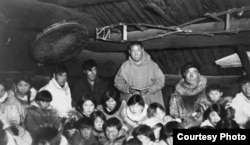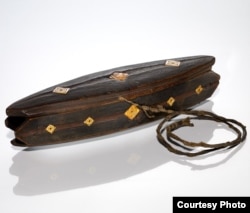For thousands of years, the Yup'ik people of Alaska have depended on cultural traditions for their way of life. From one generation to the next, Yup’ik community leaders passed on their knowledge and skills to younger members of the tribe.
Now, some of these traditions may prove helpful to fighting substance abuse, depression and suicide within the Alaska Native community.
Knowledge from tradition
Over the years, the lives of the Yup’ik people centered around the qasgiq, a house where many men lived and worked. Community celebrations were often held in the qasgiq. Most importantly, this also is where community leaders passed on their knowledge to the next generation.
"Our ancestors and grandfathers were like psychologists," said Billy Charles, a fisherman and former mayor of Emmonak, a rural town in southwestern Alaska.
"They had a system of early childhood development in place, and with every teaching, they'd say, ‘It may not apply to you now, but later on in life when you meet the challenge, you'll know what to do.'"
Today, Charles serves as a researcher in the University of Alaska Fairbanks' Center for Alaska Native Health Research. He works to prevent health problems, such as drug abuse and suicide, in native communities.
Problems tied to colonization
Research shows that Alaska Native youth have a greater risk for drug and alcohol abuse than any other population group in the state. In 2015, more children died from suicide than any other cause.
The reasons have been linked to the shock of colonization. Russia established colonies in Alaska in the 18th century. In 1867, the United States purchased the territory from Russia.
As with Native American children in other parts of the U.S, the government removed Alaska Native children from their families and placed them in Christian schools. There, the boys and girls were required to give up their language, culture or religion.
Today, Alaska Native communities face a number of problems: poverty, poor housing, under-employment, drug abuse, violence and mental health issues.
The location of villages is also an issue, noted Evon Peter, an administrator for rural, community and Native education at the university. Peter is a Neetsaii Gwich'in and Koyukon Native from Arctic Village in northeastern Alaska. He told VOA that most Alaskan villages are very rural, and not connected by roads.
"For me to travel from Fairbanks to some of our villages, it's two days of travel and at least three different plane rides, sometimes costing as much as $2,000,” Peter said. He added this creates many difficulties for people to find work or receive medical or behavioral health care.
Climate change also creates problems for some communities, said Stacy Rasmus of the Center for Alaska Native Health Research.
"Alaska Native people are still very subsistence-based, very dependent on land-based food," Rasmus noted. She added that communities that hunt whales are finding it more dangerous to travel through ice, and some villages are having to move because they are losing land to rising ocean levels.
New solutions from the past
However, Rasmus said not all Native Alaskans are at risk of drug addiction or suicide. Earlier research has shown that Natives who are more connected to their traditional culture and language are less likely to take their own lives.
Rasmus and Charles have developed a cultural-based training and teaching guide called the Qungasvik, the Yup'ik word for "toolbox." Traditionally, Qungasviks were wooden boxes Yup'ik men used to keep tools and tobacco. They are designed to help young people build resiliency.
The book, available online, has 36 activities based on Yup'ik traditions. One of them involves recreating the qasgig to provide young people a way to connect with older community members. This can help them learn about their culture and history, develop life skills and take part in community life.
"Our elders instruct us that... we must gather together, hold hands and form a circle around our youth, sheltering them from evil," said Josie Edmund, in a video that is part of the Qungasvik.
"The point is to communicate to children that… you are valuable members of our community, and therefore, have much to live for."
This month, tribal representatives and mental health experts met with University of Alaska researchers for the first Statewide Gathering to Celebrate and Support Community Strengths. The goal of the meeting was to have experts come to share success stories and develop the best ways for improving mental health in native communities.
I’m Phil Dierking.
Cecily Hilleary reported this story for VOAnews.com. Phil Dierking adapted her report for Learning English. George Grow was the editor.
Do you have cultural traditions that you use for mental or physical health? We want to hear from you. Write to us in the Comments Section or on our Facebook page.
_____________________________________________________________
Words in This Story
apply - v. to have an effect on someone or something
challenge - n. something that is hard to do
elder - n. a person who has authority because of age and experience
instruct - v. to teach (someone) a subject, skill, etc.
psychologist - n. a scientist who specializes in the study and treatment of the mind and behavior
subsistence - adj. where people produce food to eat themselves rather than to sell.
tobacco - n. a plant that produces leaves which are smoked in cigarettes, pipes, etc.








